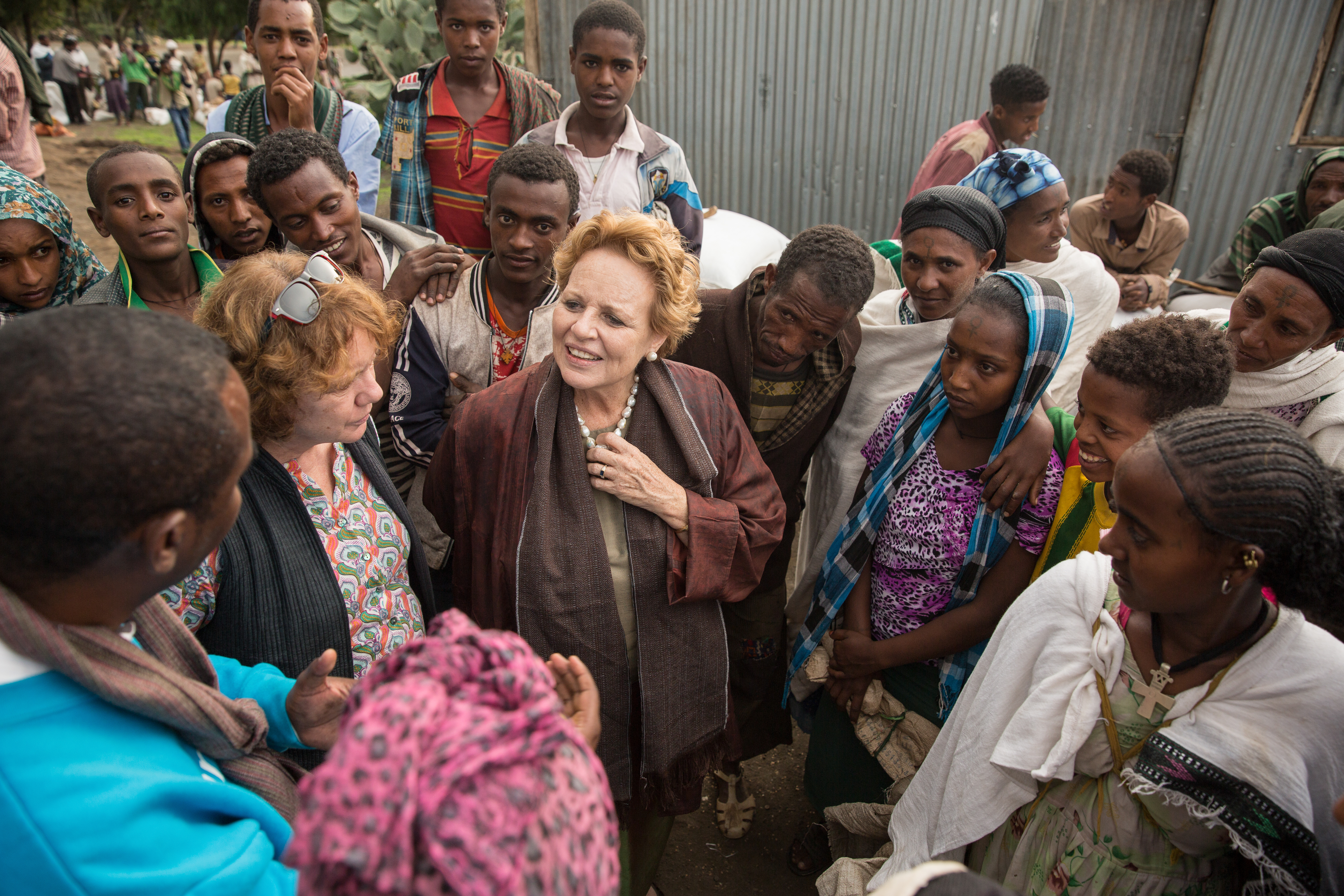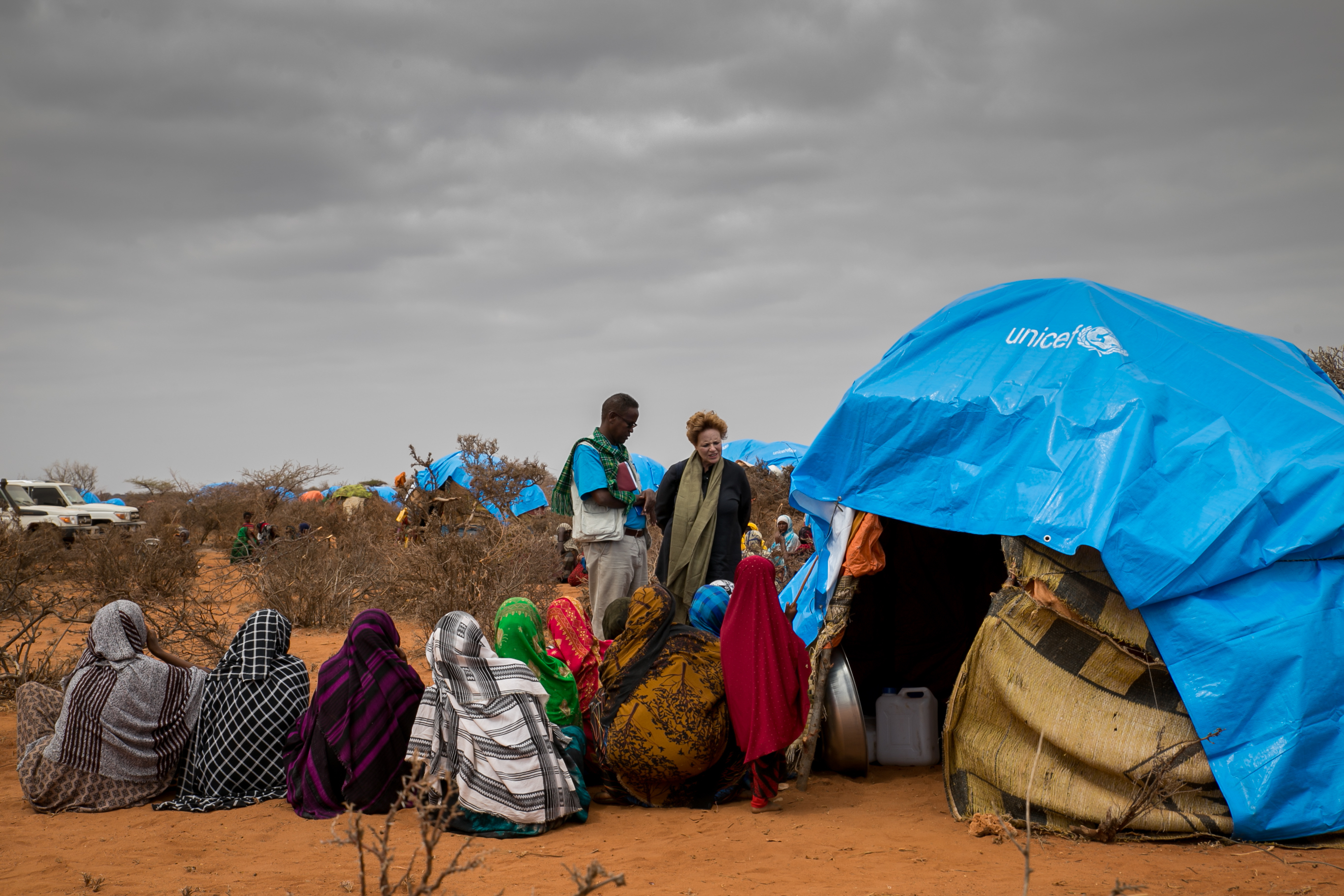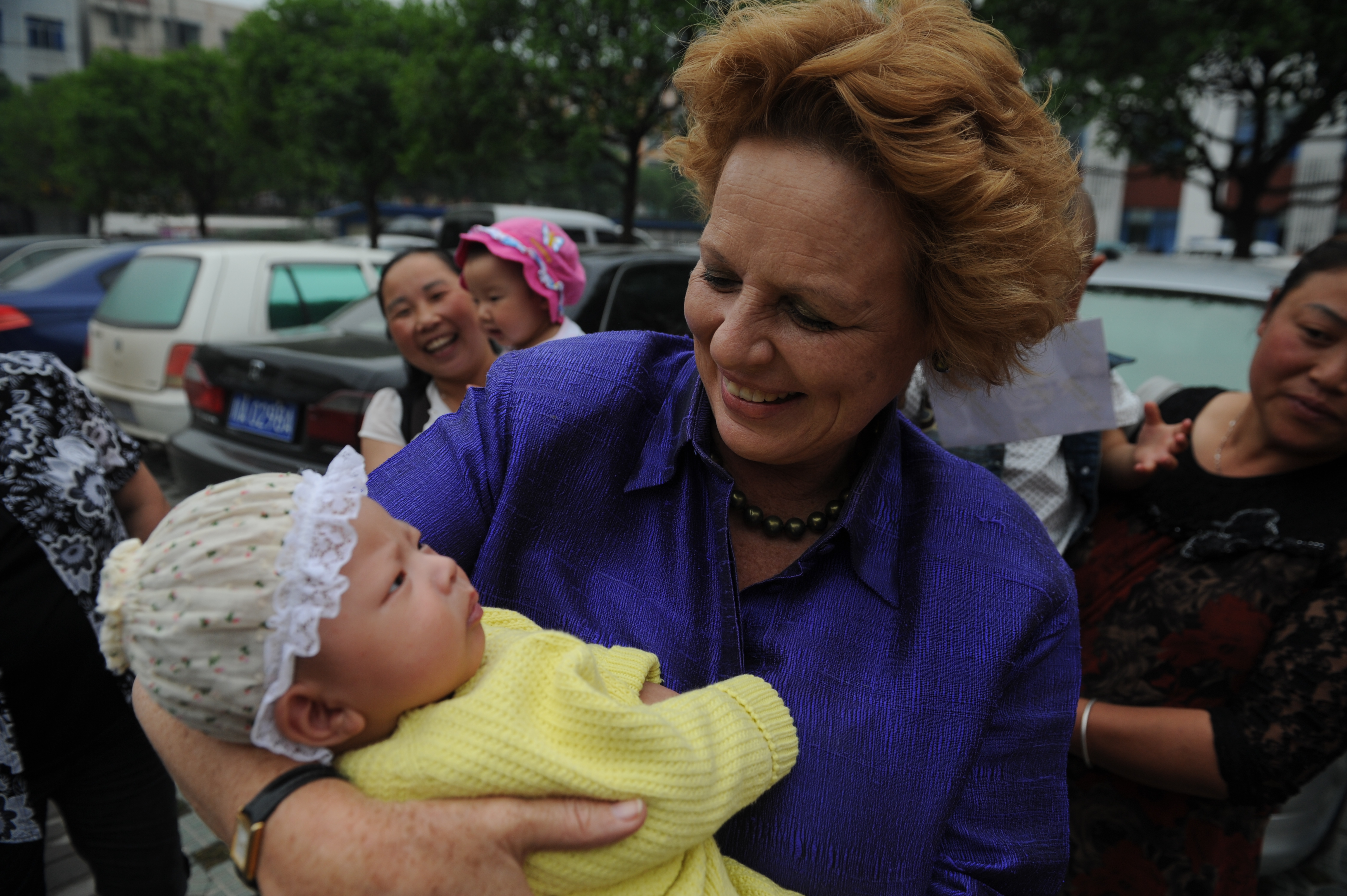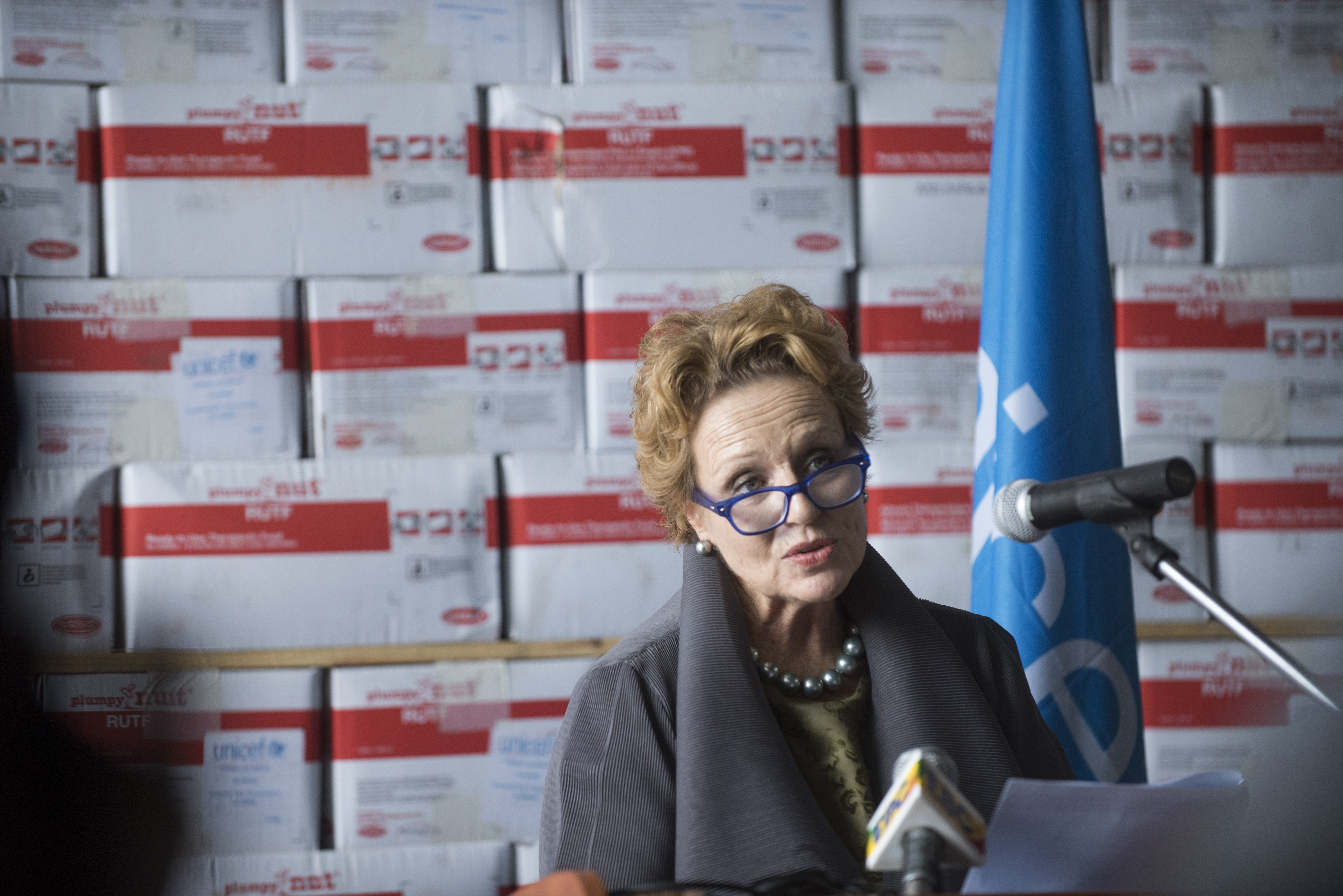Gillian Mellsop: from Auckland to Addis

By Robin Davies
After nearly twenty years in the Australian aid program, Gillian Mellsop turned her attention to child rights.
In need of a solar-powered vaccine refrigerator? Try Haier, a huge Chinese appliance company. That’s where UNICEF, the United Nations Children’s Fund, shops. But Haier is more than just a vendor to UNICEF. Thanks to what began as a commercial relationship, it’s also a donor, a major source of support for UNICEF’s education programs in China.
The Chinese government, too, has a dual relationship with UNICEF. It receives UNICEF assistance, financed partly by domestic private donors, but also works in partnership with the organisation in determining priorities for development assistance to Africa. When Xi Jinping announced US$60 billion in new assistance for Africa in 2016, UNICEF’s influence ensured that some of that funding would go toward maternal and child health programs—no mean feat, given China’s strong preference for investing in mammoth items of hardware.
Gillian Mellsop is used to such dualities. In fact, she has helped to create them. She headed UNICEF’s China office at a time when China was rapidly expanding domestic social programs, consolidating its status as an emerging donor country and becoming a net source of philanthropic giving. From there, she moved directly to her current role as head of UNICEF’s office in Ethiopia, a growing recipient of Chinese aid.
A Kiwi, Gillian began her career in the aid division of the New Zealand Ministry of Foreign Affairs and Trade. She soon moved across to what was then the Australian International Development Assistance Bureau and later became the Australian Agency for International Development (AusAID). She worked there for nearly two decades.
In the course of her several Australian government postings she found herself running Australia’s substantial aid program in Bangladesh while still a relatively junior Attaché, supporting the management of what was then Australia’s largest ever aid project—the Mekong Friendship Bridge in Laos—and developing water and sanitation and HIV/AIDS prevention and care projects for neglected Northeast India. When Australia shifted from budget support to project aid in Papua New Guinea, she travelled with engineers to scope possible infrastructure investment opportunities in multiple provinces, her baby daughter in a backpack.
In 2003, Gillian joined UNICEF as head of its Pacific office in Fiji where, among other things, she established a regional child protection program with financial support from the Australian government and help from young lawyers posted across the Pacific under the now-defunct Australian Youth Ambassadors for Development program.
Since that time, Gillian has had an uninterrupted run of field positions with UNICEF, heading its offices in Nepal, China and now Ethiopia. Over the course of her 32-year career in international development, she has somehow managed to spend about two-thirds of her time in developing countries.

A rare perspective
Gillian has a rare and hard-earned perspective on the similarities and differences between developing countries, and on what can and cannot be achieved by external actors. She has worked in, on or with Bangladesh, Laos, Papua New Guinea, India, Nepal, Bhutan, Fiji, China, Ethiopia, as well as undertaking shorter stints in many other countries.
She experienced early on the havoc that conflict can wreak on development. In Nepal, Australia’s long-running community forestry program in the Sindhu Palchok and Kabhre Palanchok districts had been successful in establishing community-managed reafforestation programs. The program included literacy courses for women, intended to help them to engage in and benefit from forestry management interventions. However, Maoist forces operating in the area were preventing literacy tutors from conducting their evening classes. Australia’s project team had to do some delicate negotiating before the Maoists eventually decided that the classes provided real benefits for the communities involved, and gave up harassing the tutors.
For many years now, Gillian has been mainly concerned with the the challenges facing children—together with the closely related challenges facing women and adolescent girls. Sometimes these are unique to individual countries and require quite specific, locally devised responses. In China, for example, there are around 60 million ‘left behind’ children in rural areas. Their parents have moved away to work in cities, usually in factories, and might come home as infrequently as once a year.
“The children might be well looked after by their grandparents, but those grandparents often lack education. Many of the children suffer feelings of isolation and a lack of love. For these children, UNICEF created a ‘barefoot social workers’ program which works at the village level to help them have more contact with their parents via Skype or telephone, and with each other in local child-friendly spaces.”
In Nepal, the Maoists relied heavily on child soldiers. Many families were forced to give up one member to the Maoists and often gave children to serve as soldiers, cooks or spies.
“These children missed out on education and were involved in gruesome conflicts. They needed not only remedial education, but also psychosocial support. After the peace agreement, UNICEF established a large program to reintegrate 10,000 children who had been part of the Maoist army. We worked with communities to take these young people back, helping them to get back into school or undertake vocational training. The program was extensive and successful, reaching across the country.”
And the problem of female genital mutilation, while widespread, is particularly prevalent in certain countries. According to the latest demographic health survey undertaken in Ethiopia, where Gillian now works, 65% of women aged between 15 and 49 have been circumcised. Ethiopia is second only to Egypt in this harmful traditional practice. At least, according to the same survey, its prevalence among adolescent girls aged 15-19 years is now approximately 50%, compared to 75% of women older than 30, with particular gains made since 2000. This, Gillian suggests, looks like evidence that cooperation between the Ethiopian government, UNICEF and various other partners is working.
Despite the country-specific nature of many development challenges, and regardless of the presence or absence of conflict, Gillian has observed that the circumstances of vulnerable and disadvantaged children tend to be all too similar across countries.
“UNICEF focuses on the most disadvantaged children. And there are similarities in their situation, whether they’re in middle-income countries or least-developed countries. Regrettably, you find violence against children is really at quite unacceptably high levels in all of the countries I’ve worked in.”

Making an impact
Just as UNICEF has to tailor its programs to local circumstances, so it has to tailor its expectations of impact. Sometimes durable, national-scale impacts can reasonably be expected, sometimes not.
In China, Gillian saw good examples of effective UNICEF programs being taken up by provincial governments and at the national level. For example, the barefoot social workers program, mentioned above, is now being scaled up by the national government across all provinces. Gillian’s team also successfully advocated for including early childhood education in the Chinese government’s national education policy.
“After the end of the Maoist era and government-run work units, there was no longer any state support for early childhood education. UNICEF began to model, in some of the poorest parts of the country, how important it was to provide education for children aged from three to six. Children did much better at school and fewer children had to repeat grades. UNICEF took Chinese officials on study tours to learn from other countries’ early childhood education programs and developed costing models.
Eventually the State Council made a major policy decision to provide every child between three and six with three years of early childhood education by 2020. Now UNICEF is helping with curriculum development, teacher training and even with designs for early childhood education facilities.”
As government capacity varies considerably across countries, so does the nature of UNICEF’s support.
For instance, in Ethiopia, where the problems facing children are of a very high order, and government institutions are still developing, Gillian’s country team provides direct support to procure vaccines, other medical supplies and ready-to-use therapeutic food for severely malnourished children. Emergency-related work is prominent given the impact of recurrent, climate change-related droughts and other natural disasters. Mobile health and nutrition teams provide preventive health care and treat children with moderate and acute malnutrition in drought affected pastoralist areas, supported with funds raised by the Australian National Committee for UNICEF. Gillian credits these teams with saving the lives of thousands of children.
Even in this environment, policy outcomes are not beyond reach. For example, UNICEF has successfully advocated for the national roll-out of a program for the community management of acute malnutrition in Ethiopia. This program ensures that severely acutely malnourished children can, in many cases, stay with their families and be treated at home instead of being transferred to feeding centres like those seen in images from the 1984 famine. Gillian also points to the importance of the Ethiopian government’s commitment to end child marriage and female genital mutilation by 2025.
Ethiopia is also at the forefront of a different kind of outcome—one that is personally very satisfying to Gillian. During her time in China, UNICEF decided to increase efforts to influence the Chinese government’s South-South cooperation priorities in favour of maternal and child health in Africa. These efforts resulted in a memorandum of understanding between China and UNICEF and a series of UNICEF-sponsored China/Africa meetings on health-related assistance.
Now, drawing on Xi Jinping’s US$60 billion aid pledge, China is designing a multi-country maternal and child health program that will also benefit Ethiopia.
“It’s exciting to now be in Ethiopia and see the fruits of the work that we undertook, where China is designing maternal and child health programmes that provide support to primary health care facilities at the sub-national level. The program is going to be rolled out with UNICEF as the facilitator in seven African countries. And it’s moving much faster than we thought it would.”

Two kinds of balance
Gillian’s career has been unusually balanced between bilateral development agencies and the multilateral system. She was pleasantly surprised when she moved to UNICEF’s Pacific office in Fiji to find that working there felt not so very different from working at a bilateral development agency like AusAID.
There were, however, some real contrasts. UNICEF, with its clear mandate and policy priorities, has greater strategic consistency than a bilateral agency. It also has better access to governments, on the whole, because it is seen as a neutral body. A bilateral agency is inevitably perceived to be operating within the framework of its government’s foreign policy objectives. On the downside, UN agencies face constant budget uncertainty.
“When one works for a bilateral agency, policies change as governments do and sometimes as ministers do. In the UN, it’s easier to stay on track. But, on the other hand, it’s harder to find the sort of funding that bilateral agencies control. In a bilateral agency, you know what you are able to fund and you can generally keep your commitments. In the UN, the situation is more uncertain and fundraising is an extremely consuming part of the job.”
Overall, Gillian’s career has also been unusually balanced between headquarters and ‘field’ roles, even if all her work for UNICEF over some 14 years has been field-based. UNICEF, unlike most bilateral development agencies, is quite decentralised and doesn’t require its staff to cycle through headquarters every few years. Although Gillian has received occasional requests to take on a headquarters role, she prefers field work and appreciates the degree of latitude allowed to UNICEF country directors.
“We obviously work closely with the regional office in Nairobi, and with headquarters in New York and Geneva on political, legal and fundraising issues. But we have much more autonomy than most other UN agencies to actually deliver our program, raise our funds, and recruit our staff.”
A mixed blessing
Adding a layer of complexity to Gillian’s work with UNICEF is the fact that much more of the organisation’s funding is now coming from private donations. A lot of this income is earmarked for specific countries and often specific programs within those countries. Keeping private sector donors informed and happy about where their money is going is important but also time-consuming. Sometimes, the effort is not entirely proportional to the amount of money involved.
“We get some corporate and private philanthropic donors that require quite a lot of management. Yes, we are getting more funding from private sources but the transaction costs involved in managing those relationships can be quite high. And some private donors are now insisting on matching funds, which puts extra stress and strain on our teams.”
Nevertheless, much of the funding from UNICEF’s many National Committees, which derives primarily from individuals, is provided with full flexibility, and some major private donors, such as the Ikea Foundation and the Bill & Melinda Gates Foundation, have a good understanding of UNICEF’s work and the benefits of flexible funding.
Thanks in part to Gillian herself and a strong private sector fundraising team, most of UNICEF’s work in China is now financed with money raised from private sources within China, including Chinese corporations. And not only Haier, but other corporations such as Hainan Airlines, are becoming important new sources of support for UNICEF’s work worldwide. Private funding might be a mixed blessing but it is, Gillian stresses, still a blessing.

Performance and patriarchy
Gillian has been in leadership roles for a long time, heading teams that are diverse in terms of both expertise and cultural background. This hasn’t been without its challenges.
“Obviously there are always challenges, particularly when you’re dealing with different cultures and you’re a female leader. Some of the most challenging times I have are dealing with performance issues, particularly with male colleagues from patriarchal societies.”
Gillian feels that she had much to learn, and has indeed learned a great deal about how to work and lead effectively in very diverse situations.
“I always think through challenging personnel issues. I’ll often talk to a peer or a coach on how best to approach a person. The world over, if you’re prepared to put the time into active listening with your staff, particularly when you’re addressing performance issues, it may not solve the issue but, at least, staff feel they’re heard before you decide on next steps.”
She undertook a UNICEF leadership programme for senior women soon after she joined the organisation and has had occasional management coaching since then. These experiences have given her a chance to reflect on alternative leadership styles. More importantly, they have confirmed her intuitive approach.
“I learned just to be myself, to be authentic to who I am, and to play to my strengths, and I think this approach has built my confidence as a leader. My philosophy in leading is to build an enabling environment where all the staff, no matter where they come from, can perform at their best. And, particularly in a multicultural environment with a large complement of national staff, to be very respectful, very accessible to staff, whether it be the driver who wants to tell you about a medical issue his wife has, or to senior staff wanting to have a career discussion about where they go next.”
Gillian expects to complete a full term as country director in Addis Ababa. What happens after that? Perhaps her home town, Auckland, will beckon. That would make of her life a very full circle.
Download the full transcript of Robin’s interview with Gillian here. You can also listen to the podcast here.
Robin Davies was the Associate Director of the Development Policy Centre, ANU.
Disclosure: Robin was a Non-Executive Director of UNICEF Australia for several years, until September 2017.





